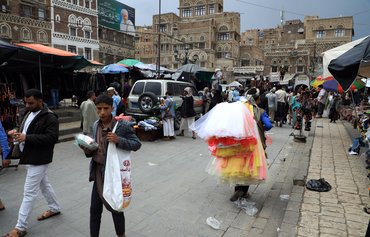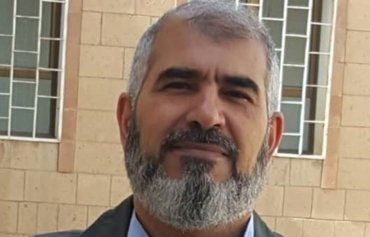ADEN -- The Iran-backed Houthis' ongoing violation of the rights of Yemen's Bahai community, including a recent raid on a peaceful meeting in Sanaa held by the religious minority, continues to raise concern among rights activists.
During the May 25 raid, the Houthis detained 17 members of the Bahai community -- including five women -- and confiscated their belongings. They took them to an unknown location, and one of the detainees was later released.
Following the raid and arrests, the Houthis' Grand Mufti Shamseddin Sharafeddin made remarks against the Bahai in a Friday sermon.
He accused the detainees of apostasy and treason, and said "they must be killed if they do not repent".
![This picture, taken October 12 on Mount Carmel (Mount Mar Elias) in northern Israel, shows a view from the top of the Shrine of Bab at the Bahai Terraces, or the Hanging Gardens of Haifa. [Ronaldo Schemidt/AFP]](/cnmi_am/images/2023/06/28/42714-Israel-Bahai-shrine-600_384.jpg)
This picture, taken October 12 on Mount Carmel (Mount Mar Elias) in northern Israel, shows a view from the top of the Shrine of Bab at the Bahai Terraces, or the Hanging Gardens of Haifa. [Ronaldo Schemidt/AFP]
![The Iran-backed Houthis have consistently persecuted religious minorities in Yemen, including members of the Bahai community. [Mohammed Huwais/AFP]](/cnmi_am/images/2023/06/28/42713-Houthis-Yemen-Bahais-600_384.jpg)
The Iran-backed Houthis have consistently persecuted religious minorities in Yemen, including members of the Bahai community. [Mohammed Huwais/AFP]
Throughout the Yemen conflict, the Houthis have continued to violate the rights of religious minorities, including followers of the Bahai faith.
There are around 2,000 Bahai in Yemen -- around 1% of the country's non-Muslim population.
The Iranian regime, which supports, funds and arms the Houthis, oppresses and persecutes the Bahai community in Iran, and the Houthis have followed suit since they seized power in Sanaa, clamping down on Yemeni Bahai.
There are numerous examples of the Houthis' violations of Bahai rights.
In 2016, the Houthis stormed a Bahai conference in Sanaa and detained at least 60 men, women and children.
In May 2017, the UN special rapporteur on freedom of religion or belief warned an "escalation in the persistent pattern of persecution of the Bahai community in Sanaa mirrors the persecution suffered by the Bahai living in Iran".
In 2018, the Houthis charged some 22 Bahai with apostasy and espionage without due process.
And in 2019, the United States urged the Houthis to end their mistreatment of Bahai, after the community criticised a prosecutor's allegations against a Bahai sentenced to death as "absurd".
Denouncing Mufti's remarks
Human rights activists condemned the remarks of the Houthis' Grand Mufti against followers of the Bahai faith, warning they may lead to unrest and violence.
The Yemeni Initiative for Defending Bahais' Rights said the detentions of and hate speech against the minority group are carried out under the Islamic Republic's order.
The Houthis receive their direct orders from another country -- Iran -- to pursue, arrest and torture Yemeni citizens, especially members of the Bahai community, the group said on Facebook.
The Bahai International Community also denounced Sharafeddin's remarks, describing them as "a sermon full of blood, misinformation and hatred against the Yemeni Bahai community".
The sermon aimed to incite hatred and raise suspicion among Yemenis against the Bahai community, it said.
United Nations Office of the Human Rights Commissioner spokesman Jeremy Laurence on June 9 condemned the use of "any language that incites discrimination and violence, particularly against minorities".
Delivering a briefing in Geneva, he noted that in addition to contravening international law, this "often leads to forced exile and displacement".
"We remind the de facto authorities [Houthis] in Sanaa that they must respect the human rights of people living under their control," he said.
The Houthis have persecuted the Bahai community, and "even attempted to eradicate them", said lawyer and human rights activist Abdul Rahman Berman.
They have done this in many ways, including forced disappearance, detention and illegal trials before Houthi courts, which have no legal standing, he said.
The Houthis have issued death sentences for members of the Bahai community, confiscated their funds and property, and closed institutes and associations affiliated with the minority group, he told Al-Mashareq.
"The incitement of hatred by clerics raises fears about the destruction of the Yemeni social fabric, which was known for its cohesion and convergence," he added. "This will result in massive waves of violence and counter-violence."
The Houthi Mufti's remarks against the Bahai amounts to "incitement against anyone who disagrees with the Houthis", Berman said.
'Culture of fear'
The Houthis' persecution of Yemen's Bahai community is "spreading a culture of fear", Yemeni Deputy Minister of Legal Affairs and Human Rights Nabil Abdul Hafeez told Al-Mashareq.
By violating Bahai rights, the Houthis demonstrate their extremist sectarian ideology, which insists everyone other than themselves is wrong and prompts them to fight the followers of any other group, he said.
The Houthis want only their own ideology to be dominant, political analyst Fares al-Beel told Al-Mashareq.
The Iran-backed group persecutes the Bahai and other minorities, he said, not because it sees them as a threat but because of its nature as a militia whose members do not accept the existence of any ideology other than their own.
The Houthis previously referred to themselves as an oppressed minority, he said, but when they seized control of the state, they began to persecute minority groups, including the Bahai.

![The ongoing violation of the rights of Yemen's Bahai community, with the latest case reported May 25, continues to raise concern among rights activists. [Iran International]](/cnmi_am/images/2023/06/28/42712-Houthis-Bahai-persecution-600_384.jpg)






